
Friday December 13, 2019
By Wendy Gillis
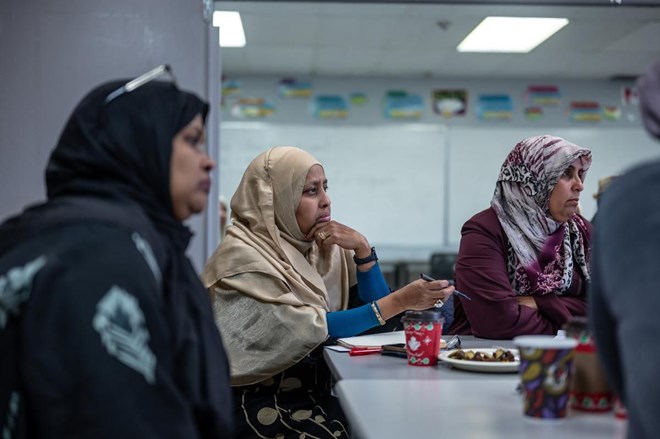
The mothers of Mending a Crack in the Sky meet in a Weston Road classroom early on Nov. 30. MOE DOIRON / TORONTO STAR
The introductions are a formality meant for any newcomers to the weekly Saturday meeting, called to order before much of the city is awake.
But, in truth, the women inside this Weston Road classroom already know each other intimately. They’re neighbours and friends who call each other “sister.” They know all too well why they’re here.
There’s Shamso Mohamoud, whose 18-year-old son was shot in the head near a Yorkdale Mall housing complex in 2008.
There’s Shamso Elmi, whose 24-year-old son was killed in 2015 in Vancouver.
There’s Ayan Ali Abddow, whose 17-year-old son was fatally stabbed outside an Etobicoke apartment in 2016.
There’s a mother whose son is recovering from a stabbing — “he’s alive, thank God,” she says — and a young woman whose brother was recently fatally shot, and yet another who had buried her nephew Irshad the day before. He was shot and left on the side of a Kitchener highway last month.
“We are all nervous in the neighbourhoods that we live in — and if there is one problem with one family, it affects all of us,” says Halima Adan, a Jane and Finch-area mother who fears for her son’s safety.
Every woman here has been touched by the violence they say is crippling their community.
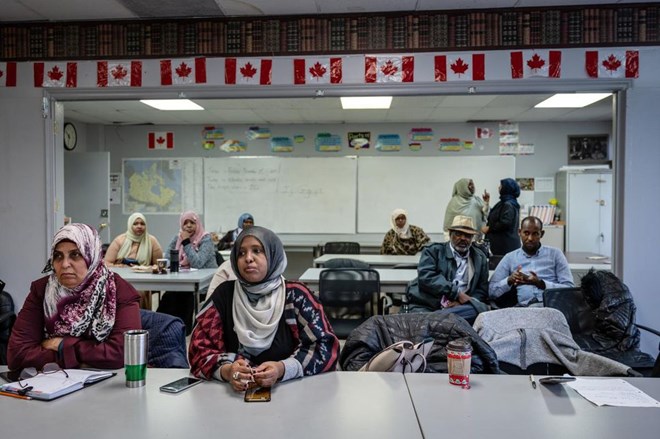
The group gather every Saturday to discuss ways they can the fight gun violence that has cost many of them their sons TORONTO STAR
But this is not a support group, though it serves that function, too. Rather the 100-plus women in the Mending a Crack in the Sky initiative are an example of what happens when grief is channelled into action, when anger fuels a drive for change.
And on Monday, they are set to achieve a years-long goal when the Toronto police board is expected to formalize a partnership board chair Jim Hart calls “unprecedented.”
If passed, the mothers will play an active role in bridging the wide gap between their community and police. They’ll meet directly with police chief Mark Saunders and help broker lines of communication with local police officers working in the city’s west side, where many Somali families live. It could serve as a pilot project for other community-police partnerships.
The move comes at the end of a year that’s seen record levels of gun violence: More than 270 people have been killed or injured in shootings so far in 2019, dozens more than the highest year-end total in 15 years.
The mothers say their Canadian-born Somali youth face disproportionate gun and gang violence, and the north-west part of Toronto — the area many call home — has once again been a hotspot for shootings this year.
Fifty-three per cent of Toronto’s shootings this year have occurred within the six police divisions that would formally partner with the mothers under the proposed agreement, an area covering the west side of the city, including all of Etobicoke and the western portion of North York.
“They are an impressive group of passionate women who have been through a lot,” Hart said in an interview this week. “They deserve some change.”
But not everyone is on board with the partnership. The mothers have faced harassment and even death threats from community members who wrongly believe the women will be working as police informants.
Still, they’re resolved.
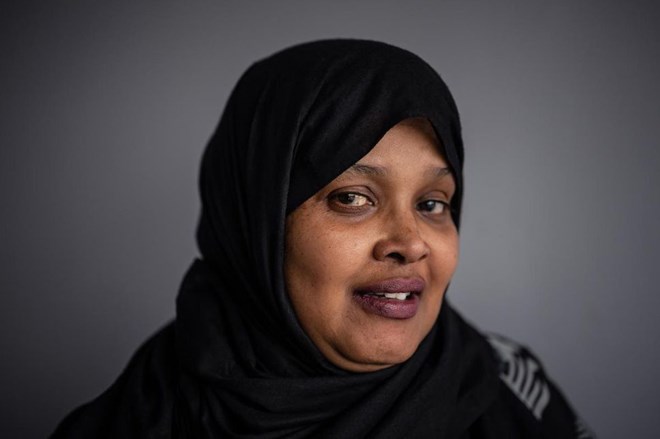
Ayan Ali Abddow, whose 17-year-old son was fatally stabbed in Toronto in 2016 ? "I'm quiet. I don't want to talk because if I talk, I talk too much.... I love my son, I want to talk about him always." TORONTO STAR
Ali Abddow’s eyes brim with tears as she speaks of her son Saed. “When your kid has died,” she says, “you’re not scared of anything.”
The grief that galvanizes these mothers arose where they thought they were safest; most came here to escape a deadly Somali civil war that began in the 1980s. But after fleeing the violence, it found them here.
Co-founder Shamso Mohamoud’s life was upended on March 15, 2008, when a gunman fired into a crowd of young people outside an apartment building near Lawrence Avenue West and Dufferin Street. After the bullets stopped flying, five people lay injured and her son was dead.
Abdikarim Abdikarim was just 18. He was in Grade 12 at George Harvey Collegiate Institute and was enjoying March break. His mother remembers he was a joker — “my name’s so nice, my momma named me twice,” he liked to say.
The high-profile shooting led to calls for action. Then-mayor David Miller promoted a campaign for a national handgun ban, saying he’d met too many grieving mothers. His tenure had seen a spike in gun violence, including the “Year of the Gun” in 2005, when the city saw 53 fatal shootings.
An emotional Abdi Warsame, once a neighbour of Abdikarim’s family from back in Somalia, issued a warning at an event launching the campaign.
“You should listen to us,” he said. If we won’t do something about the gun, he said, Toronto “will become like Mogadishu.”
Abdikarim’s death made his mother want to escape. Once a busy personal support worker and a school bus driver, she stopped working and became depressed. She begged her two other sons not to leave the house. She relocated to Alberta, and briefly moved back to Somalia.
“I was running,” she says.
When she returned to Toronto in 2014, she found a community still grappling with violence, poverty and lack of opportunity. Gang activity and shootings in one area begot more of the same elsewhere.
“It was getting worse and worse and worse,” she says. “These kids didn’t know anything about war, but these kids were scared and they started to use guns too. They said nobody is doing anything so you have to defend yourself.”
Whether it was to the graveyard or jail, she says, parents who’d moved for a better life were losing their kids. Some were wondering, was is safer back in Somalia?
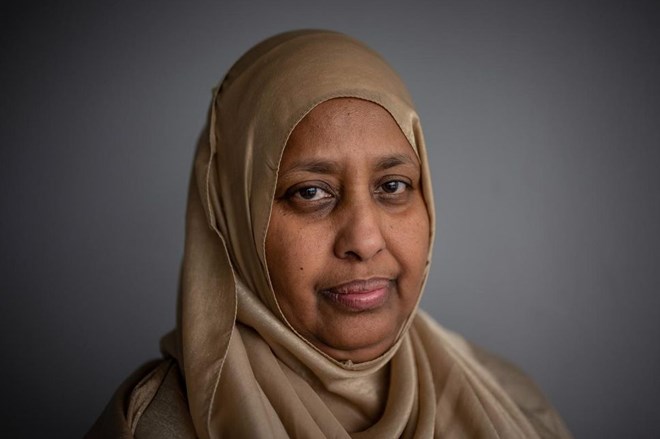
Shamso Elmi, whose 24-year-old son was killed in 2015 in Vancouver ? "Still I'm recovering and I don't see any other (grieving) mom who's said, 'I've recovered.'" TORONTO STAR
In 2015, Shamso Elmi found herself among the grieving. Her son Hussein Mohamud died in Vancouver just before his 25th birthday in a summertime killing she believes was racially motivated. No one has been convicted in his death.
The mother of seven arrived in Canada in 1987, and worked teaching life skills to fellow newcomers. Over the years, she’d met and helped other families dealing with the loss of a child to violence. Then she was among them.
“I didn’t want to go home and be depressed. I thought, ‘what can I do?’”
She connected with Mohamoud, and together the two women formed a peer-support network for mothers across the GTA and beyond who had lost a child to violence. The initiative, which they called Mother Outreach Workers, offered acute emotional support immediately after a death.
Halima Adan, the Jane and Finch-area mom, describes what the mothers’ group tells grieving parents: “It’s not your fault, don’t feel shame, don’t close your door, you have to talk about it,” she says. “We are here for you. You can cry.”
Companionship is important; both Elmi and Mohamoud knew the loneliness that seeps in after death. In the immediate days that follow a tragedy, the house is full of visitors. “Then they disappear,” Elmi says.
“That’s when we keep in touch, say: ‘Hi how are you? How are you feeling? I’m in Tim Horton’s — do you need anything?’”
In late 2015, Elmi and Mohamoud also teamed up with Midaynta Community Services, a charity that provides settlement support to immigrants and new Canadians, knowing they could provide guidance and valuable resources, including staff and a space to meet. Together with Midaynta, the group recently raised money to send a group of bereaved mothers on an August getaway to Niagara Falls.
Around the same time, the mothers also started meeting to discuss their ideas about how to stop the growing tally of dead youth — and grieving mothers. They decided to meet early on Saturday mornings, one of the few times most women are free; their meetings typically began at 7 a.m.
They developed a model where they worked as teams, going into communities where youth are impacted by violence or may be involved in gang activity, places like Lawrence Heights, Falstaff, the East Mall, Driftwood and Jane and Finch. They focused on neighbourhoods with many Somali families, but helped anyone touched by the violence.
The volunteers hosted meetings in rented or donated spaces and shared information, broad and specific. If they learned about a specific beef, they would try to de-escalate it toward a resolution, such as an apology between two feuding youth, Elmi says.
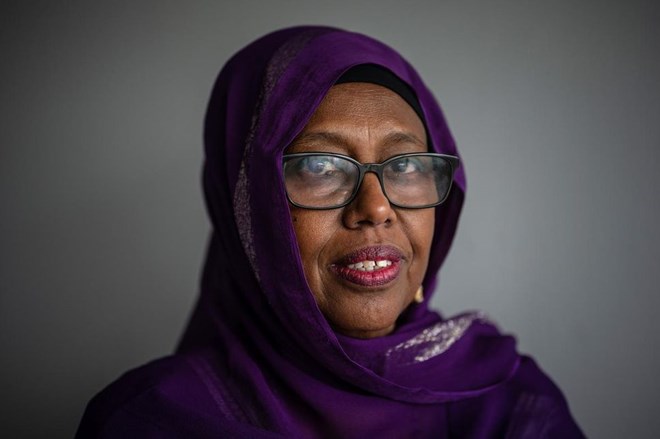
Shamso Mohamoud, whose 18-year-old son was fatally shot Toronto in 2008 ? "It's been 11 years, but I'll never forget my son. I still look for him." TORONTO STAR
The mothers gave advice about what to do to if someone in a family was getting arrested, including an overview of their rights and how to contact a lawyer. And they shared the warning signs to know a child might be involved in gang activity.
“If you see your son has new stuff, you have to be concerned, or if you see your son not coming home,” Adan says.
“We empower them, we educate them, we share with them our experiences and our stories, our success and our sorrow.”
Somewhere along the line, the mothers realized they’d launched a significant community safety initiative, one that needed a name. They drew inspiration from a Somali proverb.
“If people come together,” it goes, “they can even mend a crack in the sky.”
“What we need is an open dialogue with police,” Elmi tells the group of about 30 people gathered in the Weston Road classroom on an unseasonably warm late-November Saturday. “Why are our kids afraid of the police?”
“Bad experience,” one man answers. “Because of what (our kids) look like, how they dress.”
Later, a mother describes how her son was questioned by an officer after she sent him to the pharmacy to pick up his medication. A widow with five children, she says she obsessively checks her phone for any updates on their well-being, concerned about gang activity but also police actions.
Those within Mending the Crack in the Sky watched as the violence continued, and, three years ago, they realized they couldn’t do it alone.
“By ourselves, it’s impossible to figure it out,” Adan says. “And it’s impossible for the police to solve all these crimes without the help of the community.”
So the mothers began discussing ways to work with police, and they made their first deputation to the Toronto police board in July.
Distrust between police and the Somali community, especially young people, is a barrier. It’s due in part to the legacy of Toronto police practices such as carding, or street checks. A series of Star investigations found Black and brown young men were disproportionately stopped, questioned and documented by police. (Provincial legislation has since set strict limits on police use of street checks).
A 2013 report by the Institute for Research on Public Policy summarized in-depth surveys with 40 Somali Canadian young people, concluding the youth “encounter significant roadblocks that are not conducive to integration or social cohesion,” including “institutional racism” by police, as well as schools and the media.
Hart, the police board chair, acknowledges that distrust of police within the community will be a challenge. If the partnership passes the police board, the first thing police will have to do is “get as engaged as possible — get to know the community, become visible, get to know the mothers,” he said.
Hart said he became convinced the board should partner with the group after leaving one Saturday-morning meeting.
“I thought I would come out of there feeling sad and depressed. I came out of there feeling elated, in a way, because they are such a positive group of individuals,” he said.
At the mothers’ suggestion, the partnership with the police board would have three central goals: increased transparency, community safety and trust. Specific initiatives include building direct relationships between group members and the neighbourdhood community officers connected to the six west-end police divisions (Divisions 12, 23, 22, 23, 31 and 32).
The police neighbourhood community officers program, which was recently expanded, places the same officers within communities for a four-year assignment, with the aim to build trust between police and communities.
“It is believed that these relationships — both at the divisional and Neighbourhood Community Officer levels —will drive proactive and vital collaboration between members of Toronto’s Somali community and the Service,” reads Hart’s report to the police board.
The mothers have also suggested the idea of a “scorecard” the community can use to give feedback to police. And they’re seeking to find ways Toronto police could support the Mother Outreach Worker program through education and training on crime prevention initiatives.
If the partnership goes ahead, it will mark a success for the mothers. But it’s just one aspect of a much larger plan, in which they hope to meet with leaders from every level of government — “we are on our way to (Prime Minister) Trudeau,” Mohamoud says.
“We need help, and we need the government to help us,” Ali Abddow says. “I came here at a young age and my kids were born here. They are Canadian kids.”
Three years after her son Saed was killed, her grief is still raw — “I feel like my son died yesterday,” she says. She wants to prevent other mothers from experiencing her sorrow and whenever she hears of another shooting, it only deepens her pain.
“We have hope. We are going to change,” Mohamoud says. “Our kids, they are good, they are just youth in a wrong place, in a wrong system, in a wrong environment.”
“We want our kids to be doctors, lawyers, engineers,” Elmi continues. “To be anybody, other than in the graveyard, or in jail.”